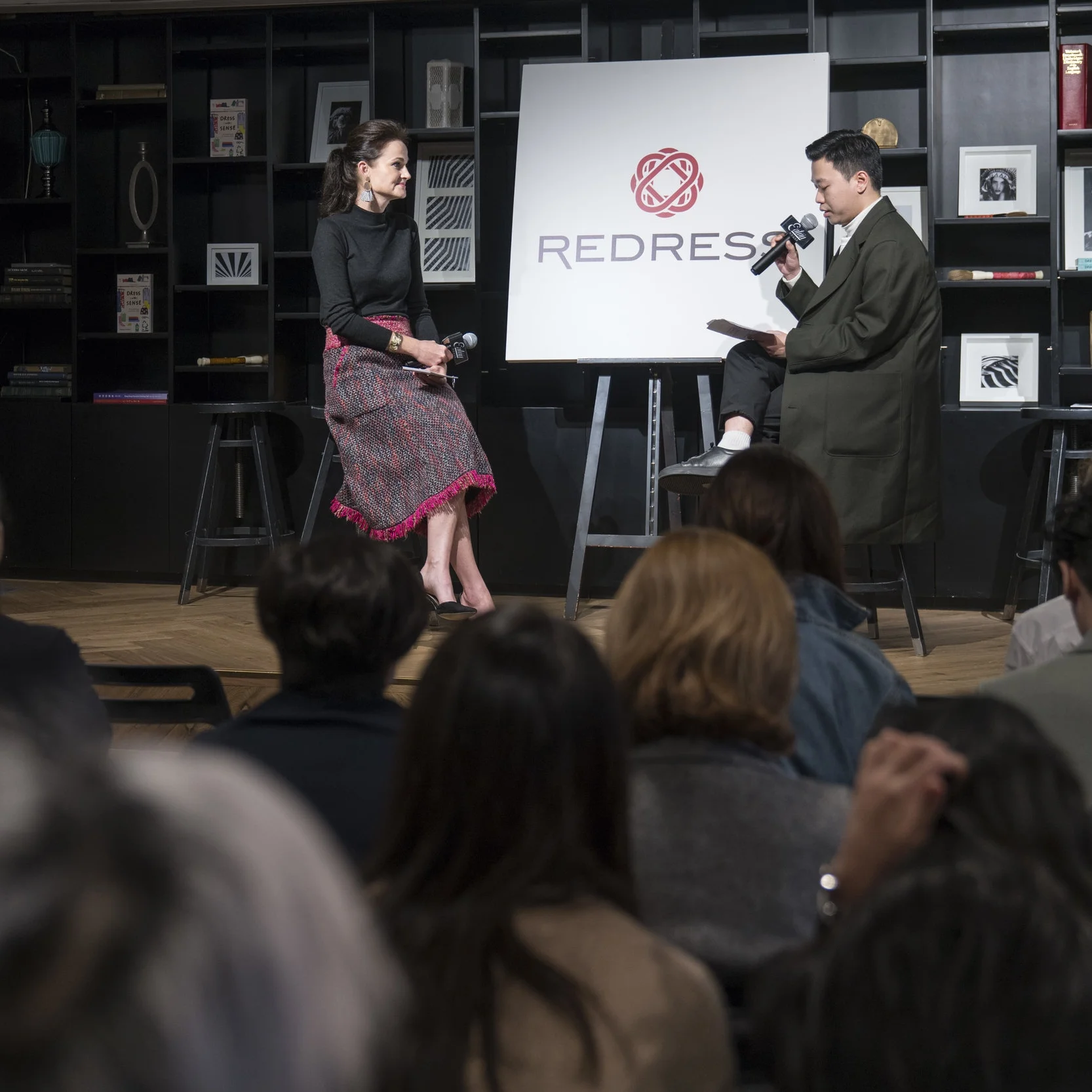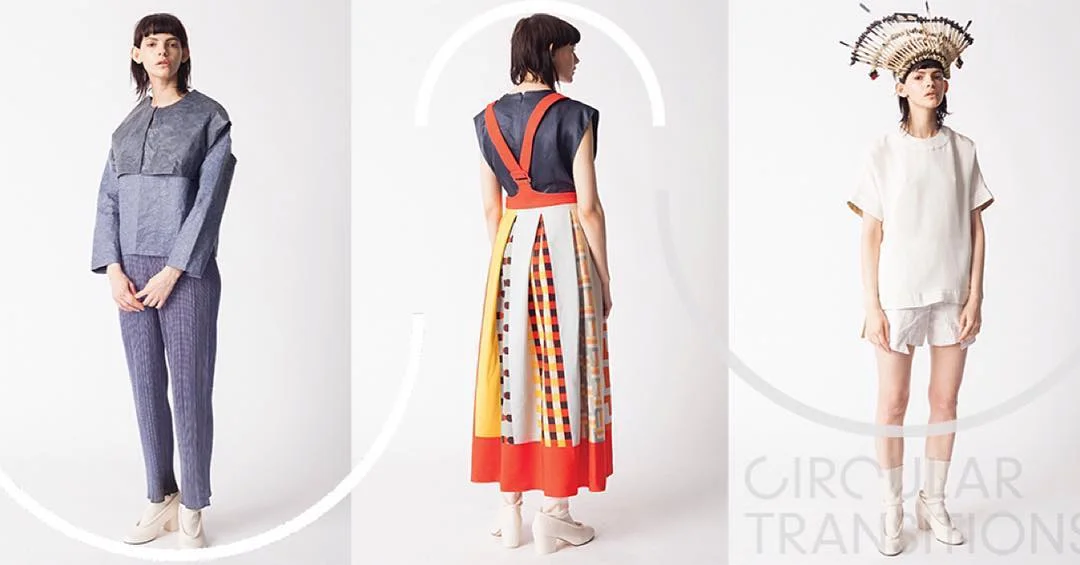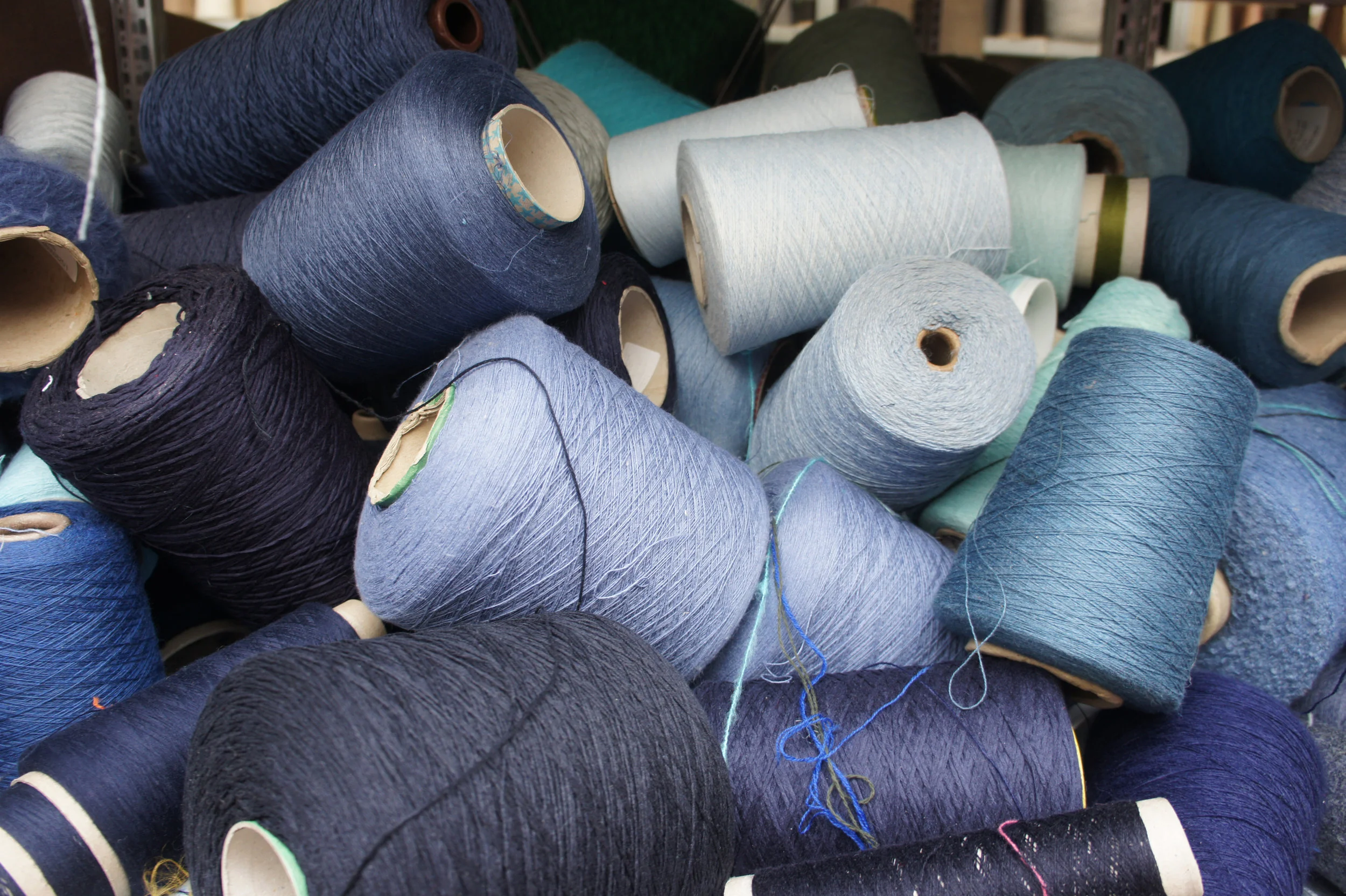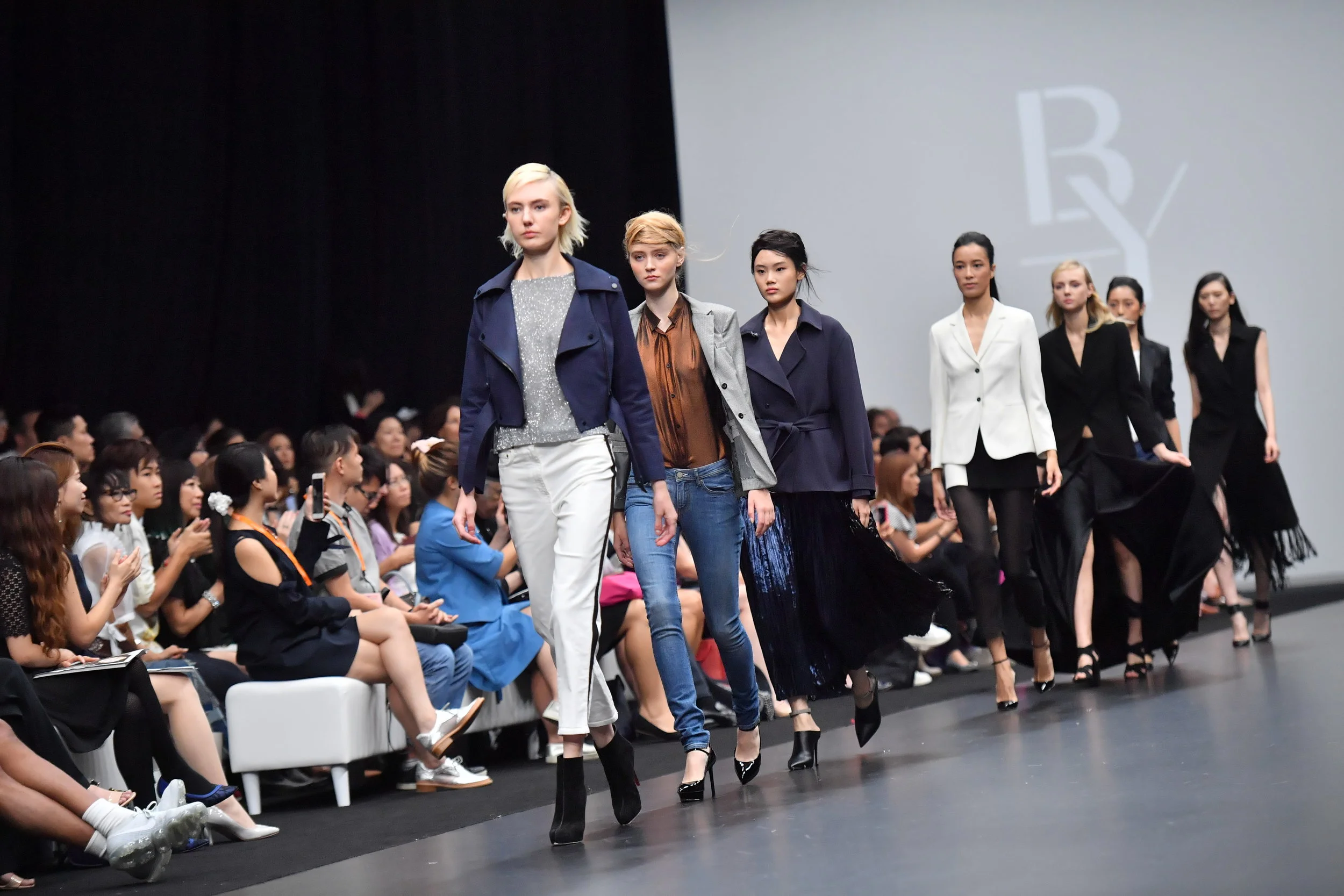We celebrated the launch of the eighth cycle of our flagship programme, the Redress Design Award (formerly the EcoChic Design Award) – the world’s largest sustainable fashion design competition - with an event underpinning our mission at Eaton House in Hong Kong on January 19th. A panel of industry experts reflected on the current state of sustainable fashion and why 2018 represents a critical tipping point for consumers, designers and brands to incorporate sustainability across the supply chain. We also heard from Redress Design Award Alumni designer Victor Chu on his experiences participating in the competition and his latest design collaboration with new up-cycling brand, The R Collective, which was on display.
THE STATE OF FASHION
Why feeling good is the new looking good
It’s not everyday that you have an ethical fashion and style epiphany whilst standing on top of a filthy Hong Kong landfill watching a queue of rubbish trucks dump their trash out. But this happened to me. This unlikely, and somewhat smelly, moment gave me such a seismic wake up call about my relationship with my clothes and how much rubbish I created that my entire appreciation of fashion was whiplashed into radical change. In that moment, with countless birds flying afoot and swooping down to eat scraps, I became an ethical fashion consumer and I committed to only wearing secondhand, vintage, upcycled or recycled clothes for the rest of my days. I have never looked back, or looked or felt better, since.
Fibres from scraps
Few fibres tick as many eco-boxes as Lyocell. Made from wood cellulose, production is clean and resource-efficient; and the product Lyocell itself, recyclable and biodegradable. Now, in a leap towards circular practices in textiles, the world’s leading producer Lenzing, introduces Refibra™, fibres made from cotton scraps. With almost 15% of fabric typically ending up on cutting room floors, closing the loop is most certainly music to our ears.
Read about more industry innovations in our magazine.
Be a shopaholic - without creating clothing waste
When it comes to writing about fashion, I’m probably not your typical columnist. I’m an ex-dentist (I’ve drilled and filled my way through London’s well-heeled Harley Street jet setters before moving to Hong Kong 11 years ago) and an ex-journalist (I’ve written about anything from the state of my sex life at eight months of pregnancy to how to spend the entire weekend naked in Tokyo). When not authoring carnally focussed articles, I’ve also written extensively about environmental matters; from China’s rampant environmental crisis to the appalling eco-footprint that the fashion and textile industry is tramping across the planet. Naturally, it was this line of journalism that led me 10 years ago to start Redress, a Hong Kong-based NGO with a mission to reduce waste in the fashion industry. I’ve never looked back.
Party season causing closet chaos
I’ve just recovered from my December’s whistle-stop travel schedule. This saw me brave the snow as New York’s twinkling Christmas lights winked at Christmas shoppers; cut through Hong Kong’s haze whilst being lured by exuberant mall displays that look more Hollywood than Hong Kong: to cozying up by warm pub fires in Britain oldest villages, where short days and long nights put you in the festive spirit. And I assure you; the party season is here. From the city to the country, whether you’re in the mood for it or not, the world is calling out for celebrations, from office parties, Christmas, New Year’s eve, family occasions to Chinese New Year.
Redress Redefined
After seven highly successful years, we are rebranding the EcoChic Design Award to the Redress Design Award. This exciting move coincides with the cycle becoming truly global in 2018 and will further align the competition with Redress and our overarching vision to reduce waste and fuel a new circular system for fashion.
Now collecting your clothing waste all year round!
Hong Kong's public unite to recycle unwanted clothing as Redress pushes for more avenues for recovery
We're leading the charge in helping the Hong Kong public rethink their wardrobe waste. In partnership with laundry experts, Miele, 4.5 tonnes of clothing were collected this week after a short citywide campaign proving that consumers have no desire to throw away their unwanted clothing – of which almost 100% can be recycled. Engaging consumers on the value of keeping clothing in action for longer through better care, the clothing drive is part of our mission to expand our work to save more clothing from landfills.
Join Our EcoChic Design Award Team!
25,000+ people reached through our educational materials, 1,700 witnessed our Grand Final live, 139 sponsors and supporting partners – these are just a few highlights from our last EcoChic Design Award cycle – and we want you to be a part of the action! We’re looking for passionate individuals to join our growing Hong Kong team! Find out about our available roles here and don't forget to share this link with your friends! In the meantime the team are gearing up for the next cycle launch in January 2018 when we will be accepting applications globally for the first time ever - watch this space!
Get informed
Materials, models and mindsets were central themes for Mistra Future Fashion’s Circular Transitions conference which took place in London this time last year, bringing together academia and industry for a deep dive into circular approaches to textile design, and leaving us energised about the future of fashion! The proceedings from this groundbreaking conference have just been published and includes 30+ papers from some of the most outstanding speakers. Redress team favourites include Jade Whitson-Smith's paper on the role of the fashion designer in influencing post-purchase garment behaviour (p122), and Karen Dennis et al on exploring models of pulling post consumer waste back in the circular fashion system (p184).
Get Redressed x Miele Clothing Drive 2017
We are now buying more clothes than ever before and have moved away from carefully looking after our clothes. Skills like cleaning, sewing and storing have fallen out of fashion and many of us are actively damaging our clothes through our everyday cleaning routines - prematurely ageing them by boiling, bleaching and tumbling them within an inch of their lives! We don’t know how to care for, or dispose of our clothes responsibly…
What happens to clothing that goes unsold?
No one knows the true scale of ‘deadstock’ clothing waste — in other words, clothes that are unable to be sold at full or discounted price and must be gotten rid of somehow.
We know that around 100 billion garments are manufactured annually. Let’s say the sell-through rate (both full and discounted) is a generous 90%, then potentially 10 million items of clothing become ‘deadstock’ every year. That’s a lot of clothes to miraculously make ‘disappear.’ So what do brands and retailers claim to do with the products they can’t get customers to buy?
Women eco game changers
EcoChic Design Award 2017 ambassador Kate Tsui represented Redress at the GGEF Women Eco Game Changer Awards Night 2017 on 18th October - a meaningful event which acknowledged and gave recognition to women leading and inspiring change, making an impact in the community and environment through innovation in Asia.
In dialogue with Dr. Frederik Balfour, Editor-at-Large at Bloomberg, Kate spoke about her personal journey towards sustainability through her role as ambassador for the EcoChic Design Award, and the positive role women can play in pushing sustainability forward in the fashion industry. She also inspired the room of guests with her stylish up-cycled outfit reworked by our EcoChic Design Award finalists from items found in Hong Kong clothing bins during the recent Redress x Miele Consumer Care challenge! Kate styled the versatile outfit with a reconstructed skirt she had up-cycled from a black evening gown that had been in her wardrobe for a few years.
Congratulations to the winners of the awards - Sandra Marichal, Elaine Ng, Juliana Lam & He Yisha. It was especially wonderful to see those pushing for positive change in the fashion industry recognised!
Get Informed
10 Steps To A More Conscious Closet
It’s not too late to celebrate Redress' 10th anniversary with us. Join in on our campaign and take the ‘10 steps to a more conscious closet’, or make a one-off donation of $10/£10/€10 to help drive our work forward. You can even show Redress some extra love when shopping with our supporting partners, who have been fundraising on our behalf this month.
Driving waste from runway to retail
BYT has arrived! Championing Redress' 10 year legacy, BYT, the luxe up-cycled social impact fashion brand - with an ambition to prove that fashion can be a force for good - enjoyed its runway debut this month in Hong Kong before hitting Lane Crawford's prestigious retail store and global online platform.
Tackling Real-Life Waste
In the lead up to the Grand Final show, our EcoChic Design Award finalists were united in Hong Kong to explore the multiple possibilities for tackling real-life textile waste scenarios. Competing in challenges focused on circular economy models, our designers crafted prototypes for new lifestyle products from Cathay Pacific’s retired uniforms at the Langham, Hong Kong; rescued discarded clothes from Hong Kong’s clothing bins through simple care techniques with Miele; and got a taste of the production line and the critical role that designers play even at the manufacturing stage with TAL Group. These challenges showed these young designers first-hand how improved interactions between designers, manufacturers and consumers can significantly alter the overall environmental impact of every single piece of clothing. Congratulations to all our winners!
Click here to revisit our favourite moments from the week.
Rewriting the rules of fashion
The quest to create positive change in fashion just moved one stylish step forward. Enter BYT, the pioneering new designer up-cycled brand born from Redress’ 10-year history.


















